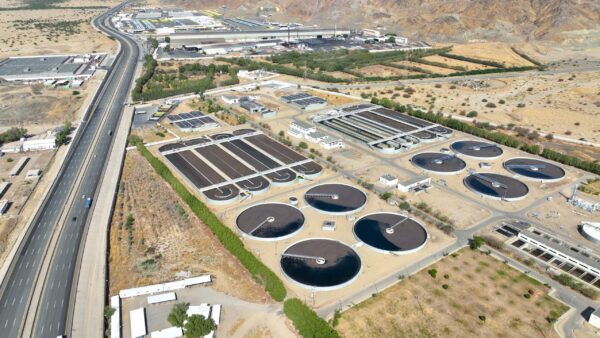

Among Hill’s many iconic restoration projects, Hala Koszyki in Warsaw, Poland stands out from the pack for some very unique reasons. “It is a first of its kind project in Poland that combines culinary concept of the old, fresh food market with the concept of modern commercial space,” said Robert Karczewski, business development director with Hill’s Poland operation. The facility, which opened on October 21st, provides 7,000 square meters of three story space (-1, Ground Floor, +1) of various food offerings, in addition to 14,000 square meters of a state-of-the-art office space. A look back at the history will make it difficult to ignore the fact that Hala Koszyki was a rather unique feature already when it was originally built. In 1943 it was destroyed during the Soviet city bombing and rebuilt in 1949 post-war reconstruction work as a state-owned food market. “For decades, the building had undergone devastation and gradually had been losing its beautiful finishing,” Karczewski said. Designed by young, talented architect Juliusz Dzierzanowski as a combination of steel structure and red brick walls, furnished with sculptures and bas-reliefs made by renowned artist Zygmunt Otto, Hala Koszyki was built in 1909 as one of Warsaw’s three new food trade halls (Hala Mirowska and Hala on Witkowskiego square), offering the roofed space for food retailers, cooling storage area and providing the highest hygiene standards.
Hala Koszyki was often referred to as the “Baskets’ Market Hall”, or people’s bazaar (shopping area). The term “baskets” does not derive from the basket weaving workshop or shop. According to one likely version, it was rather rooted in the ramparts of Stanislaw Lubomirski, the Grand Marshall of the Crown, who decided to seal Warsaw trenches off and to strengthen them with wicker baskets. Erected around 1770, the shaft had to protect the city from cholera epidemic. Since 1949 Hala Koszyki has undergone many renovations and refurbishments, but none could be compared with the latest round of works that prompted Mateusz Morawiecki, Poland’s Deputy Prime Minister and Minister for Economic Development and Finance, to say in his address at the opening that “it will be Warsaw’s landmark, a perfect meeting place.”
Hill overcomes challenges
In 2012, the formerly state-owned property was bought by Griffin Real Estate. The investor created the original concept for today’s Hala Koszyki and, under the watchful eye of the conservator, has implemented it. The year of 2014 was the beginning of refurbishment works based on JEMS Architekci design documentation carried out under the strict supervision of the Heritage Preservation Office in Warsaw. In March of that year, Griffin Real Estate awarded Hill a contract to provide project management, cost management, investor’s works supervision and tenant fit-out coordination. With an estimated cost of $28 million, GRE-backed refurbishment work came with its own set of challenges, Karczewski said. “We had to take great care to protect four neighboring and three historical buildings on the site from collapsing. Mariusz Maćkała, senior project manager with Hill International added: “Other challenges included erection of a diaphragm wall within clearly defined boundaries of the site, earthworks with top-down excavation as well as unique façade production and assembling system” Hill had 15 professionals on the project at its peak and had to adhere to the strict requirements set by Warsaw’s Heritage Preservation Office. “We also had to deal with integrating the unique culinary concept into the commercial space of the adjacent office area as well as to coordinate lead designer’s work with the one by the interior designer. At the same time, there was also a need to manage several packages of investor supplies.”
Today, after renovation-covering curtains had been lifted, Hala Koszyki is home to 11 pastry and grocery shops, a bakery, tearooms and 18 restaurants offering international cuisine. Once a respectable Warsaw’s landmark, the facility once again had come back as a social and culinary destination where residents and visitors can dine in various restaurants and bars while buying takeout groceries.
Thanks to Przemysław Krych, CEO of Griffin Real Estate, and his team’s great attention and care to restoration of historical buildings, Hala Koszyki in Warsaw is now among some of the world’s most renowned culinary metropolitan destinations. It emulates the likes of New York, Lisbon, Oslo, Amsterdam and Florence, where the fair and restaurant halls come under one roof, bursting with life and flavors from all around the world. Hill International is proud of being able to help to once again open Hala Koszyki’s doors.
By Ashok Dutta
Share

June 23, 2025 | Articles
Jeffrey Hurley Joins Hill’s Northern California Rail Practice

June 23, 2025 | Articles
Ready, Set, Grow: First VP Chad Koelling Takes Charge of Hill’s Mountain West Region

June 8, 2025 | Articles
PMO in Saudi Arabia: The Holistic Approach to Realizing a National Mega-Portfolio

June 1, 2025 | Articles

May 26, 2025 | Articles

May 12, 2025 | Articles
Keeping Your Water/Wastewater Programs Flowing with Public Relations

April 27, 2025 | Articles
Oiling the Machine: Steps to Successful Permitting on Infrastructure Megaprojects

April 20, 2025 | Articles
Sustainable Scaling: Solutions for Managing Risk on Europe’s Data Center Projects